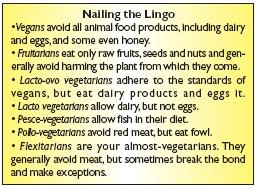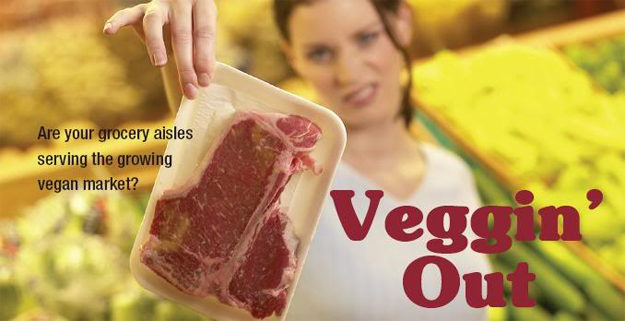If you’re interested in growing your grocery sales, try planting some seeds in the vegan section. Though vegans comprised a small group of shoppers years ago, a 2006 poll indicates it has branched out to include nearly 1.6% of all Americans (1). At roughly 4.2 million people, that’s about the population of the entire island of Puerto Rico! And, the vegan community is continuing to sprout new ground in American homes every year. According to Seth Tibbott, founder and president of Turtle Island Foods (maker of Tofurky), the population of vegetarian Americans has remained flat, while that of vegan Americans has grown steeply. “In other words, a greater percentage of American vegetarians are now vegan than ever before,” he says.
Opting for Veggies
The shift toward veganism may be rooted in the understanding that our food choices affect the long-term health of our bodies and our environment. Says Veronica Bosgraaf, founder of Pure Bar, Holland, MI, “Society as a whole is seeing animal products as less healthy and whole fruits, grains and vegetables as the solution to a healthier lifestyle. This is causing consumers to research vegetarian and vegan products more and is leading to a better understanding of these products.”
The decision to trade in animal-derived foods for fruits, vegetables, legumes and whole grains is driven by a number of factors, not the least of which includes health benefits. According to Vegetarian Times, there are many pluses associated with eating a diet rich in veggies, whole grains and healthy fats, including:
-
 Warding off cardiovascular diseases,
Warding off cardiovascular diseases,
- Maintaining a healthy body weight,
- Less risk of food-borne illnesses from undercooked meat and fish,
- Increased energy, and
- More regular digestion, thanks to the bulk that high-fiber vegetables and whole grains provide.
These health benefits are attracting meat and non-meat eaters alike to vegan foods because they believe the nutritional profiles are superior to traditional foods. Says Hans Fastre, CEO of Living Harvest, Portland, OR, “This is due to many factors—the changing dietary profile of the country, growing reception to ‘alternative’ sources of nutrition or foods that go beyond your ‘meat and potatoes’ basics.”
Personal health is a great reason for going vegan and environmental health is another (2). In fact, the U.S. Environmental Protection Agency (EPA) estimates that chemical and animal waste from factory farms pollutes 173,000 miles of rivers and streams, threatening the water supply. And, the EPA believes that about 95% of the pesticide residue found in our bodies originates from animal products. This includes heavy metals (from fish) and steroids/hormones (from meat and dairy products) (2).
On this front, Fastre notes that vegans are turning to hemp because of its nutritional sustainability. “It does not require the herbicide/pesticide input that many industrial crops do and it is not taxing on soil nutrients,” he says. Many vegans also feel their diet makes them good neighbors to both animal and human kinds. By eating lower on the food chain, estimates say the United States would save 70% of the grain produced in the country that otherwise would be used to feed livestock. This huge stock could feed 800 million hungry people (2). And, giving up meat and dairy products spares animals from often-inhumane treatment on factory farms (though cage-free and free-range animals are usually raised in better conditions).
Serving Up Vegan
Satisfaction Guaranteed. Choosing a vegan diet doesn’t mean having to subsist on lettuce and alfalfa sprouts. In fact, the category has grown to encompass thousands of tasty, nutritious options.
When sorting through the mass, one cannot underestimate the importance of quality. Unfortunately, some of the first entries into the vegan packaged food market did not follow this mantra, leaving some residual stigma on the category. “It used to be that vegans were happy to find any packaged foods that they could eat, and many vegan foods were highly processed and made with questionable ingredients, like hydrogenated oils, and lots of refined sugar,” explains Larry Kaplowitz, co-founder/owner of Bliss Unlimited, LLC (maker of Luna & Larry’s Coconut Bliss), Eugene, OR. “In recent years, I have seen a growing demand among vegans for higher quality foods that are made with whole, organic ingredients, and many companies (including ours) have responded with products that meet this need.”
Given this history, retailers must be careful about selecting packaged foods. Says Vincent Colavito, treasurer and CFO of Green Rabbit, LLC, Albany, NY, “We have noticed that our consumers want products that have as little of any unnecessary ingredient as possible without sacrificing taste.”
Buyers in doubt about whether to bring in a new line should taste everything to be sure it’s delicious and satisfying. “You never get a second chance to make a first impression,” says Tibbott. “Today’s vegan products are tastier than ever and if your product doesn’t taste great, it is won’t last long in this world no matter how nutritious it is.”
And, solicit opinions from vegans and non-vegans alike. Many nonanimal-based products were formulated for taste and nutrition, not necessarily a vegan-only crowd. For example, Kaplowitz says the goal of his Coconut Bliss line was to make “the most tasty, satisfying and nourishing frozen dessert we could possibly make. Being vegan was only one aspect of this. It was also important to us to use only certified organic ingredients, fair trade ingredients, and ingredients that are minimally processed and easy for our bodies to metabolize.”
If you’re on the fence about a food, test it on children. “They won’t compromise or lie about taste,” says Bosgraaf. “People may purchase a product a few times based on health but if it does not taste great they will not be long term buyers.”
She notes that her company’s line of organic Pure Bars incorporate nuts, healthy fats and fiber to increase satiety. And Wendy Fleet, a raw/vegan chef for The GoodOnYaBar Solana Beach, CA, says, “Our vegan bar is dense and full of high quality ingredients. A mix of fatty nuts, seeds and olive oil, combined with maple syrup, vanilla and Celtic sea salt create a filling and very tasty snack. It’s all about combining and being creative.” Soy, too, has been shown to increase satiety, while offering high-quality protein. And, soyfoods may help boost heart health, control weight and may support breast health.
Giving an Extra Boost. Finished product makers often formulate their vegan foods with the special nutritional needs of this group in mind. Case in point: protein. Since vegans pass up animal-based proteins, they must get it from other sources like beans and brown rice. Many manufacturers are also making sure their products have ample supplies of this key nutrient. Fleet notes, “I have noticed many bread and bar companies using sprouted seeds and grains which are rich in iron and high in protein. The misconception is that a vegan diet is deficient in protein and certain nutrients. A vegan diet provides more than enough. As with any diet, or lifestyle, information is important to ensure a proper balance.
At the same time, some vegans are looking for protein supplemental powders. “There has also been tremendous growth in the area of protein powder supplementation for vegans,” says Mike Fata, president and co-founder of Manitoba Harvest Hemp Foods & Oils, Winnipeg, Canada. “Hemp is ideal in this area as well. An important feature of hemp seed and hemp protein powder is that it contains all of the essential amino acids at levels that contribute significantly to the human body’s requirements.”
Omega-3s should be another staple of the vegan diet. Though these consumers don’t eat fish, some manufacturers are turning to algae-based omega-3 options (like Martek Corporation’s life’sDHA) to give vegans the DHA/EPA they need.
Other omega-3s (like ALA) are plant based. According to Fata, “Hemp is one of the best vegetable sources of omega-3 essential fatty acids, and therefore, it is a great vegan alternative to fish.” Other plant sources of omega-3s include flax, walnuts, chia and Salba.
Robert Goldberg, chief executive officer of Earth Island (manufacturer of the Follow Your Heart brand), Chatsworth, CA, notes that his company will soon launch a reduced-fat Vegenaise product that includes healthy oils (flaxseed and olive oil).
Like all shoppers, vegans should be sure they are eating omega-3s and omega-6s in the proper ratio. Fata cites Andrew Weil, M.D., who notes that hemp oil naturally offers the ideal three-to-one ratio of essential fatty acids. He also points out that the seed is a source of the “super omega-3” stearidonic acid (SDA), which is the “first metabolite in the omega-3 family and therefore easy for the body to process. It is also a plentiful and rare plant source of the ‘super omega-6’ EFA called gamma-linolenic acid (GLA).”
Companies are also fortifying their foods with key nutrients for bone health. For example, Green Rabbit will soon launch a non-dairy, non-soy beverage fortified with calcium and vitamin D.
Living Harvest, too, adds vegan sources of these nutrients plus vitamin B12 to its hempmilks. The latter is typically lacking in the vegan diet because it is not readily available in plants. But, it’s an important vitamin for neurological function and energy. New research also indicates that this vitamin may be as crucial as folic acid in preventing brain and spinal cord birth defects, so it’s essential that vegan moms-to-be eat B12-fortified foods or take ample supplements (3).
It should be noted that many soy milks, yogurts, tofu and cheeses are fortified with vitamin B12 as well as vitamin A and remain good sources of calcium.
The Future of Vegan
The vegan category continues to evolve as these shoppers increasingly seek more options. Says Goldberg, “Vegan consumers are often very vocal about what they need and want and the market has responded to their requests with a wide range of products in previously neglected categories. Not only has there been an increased presence of vegan products, there has also been an increase in quality and availability. This has meant that consumers can now have more access to a variety products in their local markets and online than they did five years ago.”
The innovation shows no signs of stopping. Experts say to watch for improved non-dairy cheese products, frozen desserts, children’s products, grab-and-go vegan drinks, single-serve entrees, coconut milk products, beverages with interesting flavors and more. WF
References
- C. Stahler, “How Many Adults Are Vegetarian?” Vegetarian Journal, Issue 4 (2006).
- Vegetarian Times, “Why Go Veg?” www.vegetariantimes.com, accessed March 11, 2009.
- A.M. Molloy, et al., “Maternal Vitamin B12 Status and Risk of Neural Tube Defects in a Population With High Neural Tube Defect Prevalence and No Folic Acid Fortification,” Pediatrics, 123 (3), 917–923 (2009).
Published in WholeFoods Magazine, April 2009
|
Select Product Offerings Bliss Unlimited, LLC, makes eight flavors of non-dairy frozen desserts under the Luna & Larry’s Coconut Bliss brand: Naked Coconut, Dark Chocolate, Vanilla Island, Mint Galactica, Cherry Amaretto, Cappuccino, Chocolate Hazelnut Fudge and Strawberry Lemon Love. New flavors include (Naked Almond Fudge, Pineapple Coconut and Chocolate Peanut Butter) and Coconut Bliss Bars in Dark Chocolate and Naked Coconut. Earth Island (maker of the Follow Your Heart brand) makes vegan cheeses (Vegan Gourmet Mozzarella, Cheddar, Monterey Jack, Nacho, Cream Cheese and Sour Cream); vegan salad dressings (Honey Mustard, Caesar, Thousand Island, Creamy Garlic and Sesame Miso); Chicken-Free Chicken; The Unforgettables Balsamic Vinaigrettes and BBQ Sauce; and Vegenaise (original, high omega, grapeseed oil, organic and reduced fat). GoodOnYa bar offers three flavors of vegan bars (Maple Dark Chocolate [vegan], Peanut Butter Chocolate [with raw honey] and Peanut Butter Honey [with raw honey]) Green Rabbit makes MimicCreme (a non-soy, non-dairy cream substitute) and plans to launch a non-soy, non-dairy beverage and Healthy Top whipped topping. The Living Harvest line includes five hempmilk varieties, a new Organic Hemp Oil, the new line of Tempt hemp milk-based frozen desserts (launching this month) and Hemp Protein powders. Manitoba Harvest offers various hemp products including Shelled Hemp Seed, Hemp Seed Oil, Hemp Protein Powder, Hemp Protein Powder & Fiber Powder, Hemp Seed Butter and Hemp Bliss hempmilk (four varieties). Organic Pure Bars are available in six flavors: Cherry Cashew, Chocolate Brownie, Apple Cinnamon, Wild Blueberry, Cranberry Orange, and ChocChip Trail mix. Turtle Island Foods (maker of Tofurky) makes vegan foods from organic soy proteins from high-quality sources such as tofu and tempeh. |










